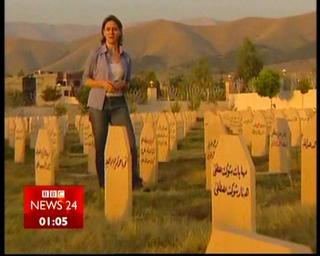, the ever miserable Caroline Haw-Hawley managed to get out of the BBC’s private enclave in central Baghdad to report from Halabja, largely bemoaning:
“but it’s not for this that Saddam’s going on trial, at least not yet, relatives of the five thousand Kurds massacred in Halabja in March 1988 will have to wait for their day in court, the first legal proceedings against Saddam are for separate killings in the town of Dujail, hundreds of miles from here”
Unfortunately Caroline didn’t have the time to tell us that “court officials say the case was chosen because it was the easiest and quickest case to compile“, which sounds quite reasonable under the circumstances, but she did manage to wrap up her piece with:
“each headstone here represents a family wiped out with weapons that Saddam Hussein bought from the West”
Just in case Caroline’s definition of “The West” unintentionally misleads anyone, here, courtesy of Scott Burgess, are figures he derived from those of the Stockholm International Peace Research Institute (an independent foundation established in 1966 under the auspices of the Swedish parliament), showing “actual deliveries of major conventional weapons” to Iraq between 1980 and 2002, expressed in millions of dollars, in relative terms, at 1990 prices:
| Vendors | $Millions | Percent | ||
| USSR | 17,503 | 50.78% | ||
| France | 5,221 | 15.15% | ||
| China | 5,192 | 15.06% | ||
| Czechoslovakia | 1,540 | 4.47% | ||
| Poland | 1,626 | 4.72% | ||
| Brazil | 724 | 2.10% | ||
| Egypt | 568 | 1.65% | ||
| Romania | 524 | 1.52% | ||
| Denmark | 226 | 0.66% | ||
| Libya | 200 | 0.58% | ||
| USA | 200 | 0.58% |
Referring to the original source, we can see that the UK’s total for this period, according to SIPRI, was $79 million dollars. We can also see that there are no figures recorded for the period from 1991-2002 – the period when UN sanctions were officially in force, which is confusing, because I distinctly recall watching, ‘Live on Sky’, as US forces found recently manufactured Russian and French arms at Baghdad airport after they liberated it from Saddam’s forces in 2003. Almost as confusing even as Caroline’s apparent understanding of “The West”, given that, according to SIPRI, over 80% of the arms sales to Iraq were from the Soviets, French and Chinese, which isn’t “The West” as I understand it, then or now.
Just to be clear though, SIPRI’s figures are based on ‘major conventional weapons’ sales rather than chemical weapons, but they give a good indication of who really armed Saddam. Moreover, chemical weapons themselves are relatively cheap and easy to make, the hardest part being the delivery systems for those weapons, which is where all those arms sales would have been useful for Saddam.
To see the report for yourself take your pick of Windows Media Hi/Lo or Realplayer Hi/Lo, starting about 20’39” from the beginning.


